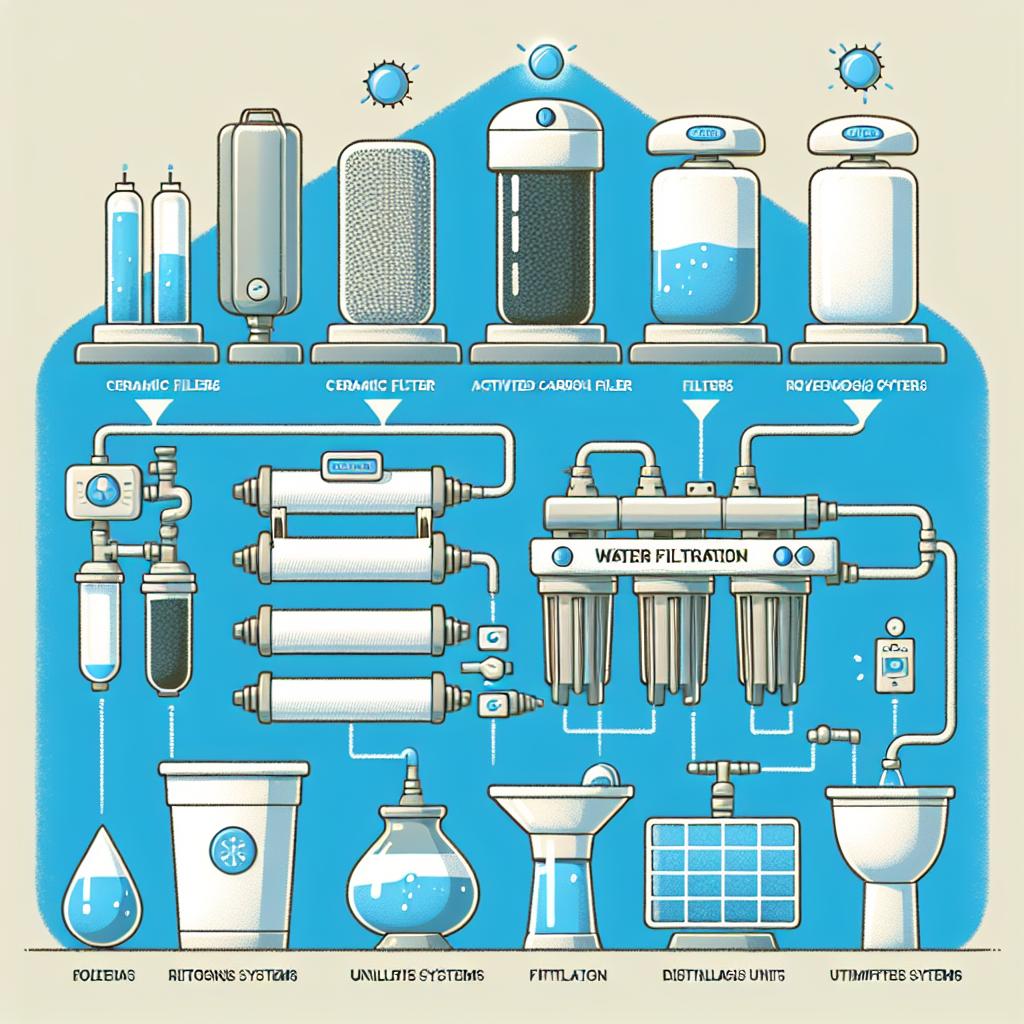Title: Sip Smart: Your Ultimate Guide to Choosing the Best Home Water Filter
In a world where hydration is key to health and happiness, the quest for pure, refreshing water starts at home. If you’re tired of the taste of chlorine or concerned about contaminants lurking in your tap water, you’re not alone! With so many options available—from sleek countertop units to under-sink systems—choosing the right water filter can feel like searching for a needle in a haystack. Fear not, dear reader! In this friendly guide, we’ll guide you through the crystal-clear waters of water filtration, helping you unravel the mysteries of different types of filters, understand essential features, and find the perfect solution to meet your needs. So grab a glass of water, sit back, and let’s dive into the simple, refreshing details of how to choose the best home water filter for you and your family!
Understanding Your Water Quality Needs
When it comes to selecting the right water filter for your home, it’s essential to first identify your specific water quality needs. Start by conducting a thorough analysis of your water source. Is it municipal or well water? Each source may contain different contaminants, affecting your choices. Common culprits to look out for include:
- Chlorine and chlorine by-products
- Heavy metals such as lead and arsenic
- Microbial contaminants
- Hardness minerals like calcium and magnesium
- Pesticides and herbicides
Once you’ve gathered this information, you can tailor your filter selection accordingly. It’s also helpful to check your local water quality report or invest in a home water testing kit. Look out for useful features in filters that cater to your needs, such as:
- Multi-stage filtration systems for comprehensive purification
- Reverse osmosis units to eliminate dissolved solids
- Activated carbon filters for chlorine and taste improvement
- UV purifiers for eliminating bacteria and viruses
Here’s a quick reference table that summarizes types of contaminants and corresponding filter solutions:
| Contaminant | Recommended Filter Type |
|---|---|
| Chlorine | Activated Carbon Filter |
| Lead | Reverse Osmosis |
| Bacteria | UV Purifier |
| Hard Water | Water Softener |
| Pesticides | Advanced Filtration System |

Exploring Different Types of Water Filters
When diving into the world of water filtration, you’ll discover a variety of options, each designed to tackle specific water quality issues. Activated carbon filters are particularly popular as they efficiently reduce contaminants such as chlorine, sediment, and volatile organic compounds. These filters typically come in pitcher or faucet-mounted designs, offering a user-friendly solution for everyday water needs. On the other hand, reverse osmosis systems take filtration a notch higher; they utilize a semi-permeable membrane to remove not only big contaminants like lead and arsenic but also smaller impurities, ensuring your water is as pure as possible. This type of system is usually installed under the sink and can deliver purified water directly from a dedicated faucet.
For those concerned about microbial contaminants, UV filters are a fantastic option. Functioning through ultraviolet light, these filters effectively neutralize bacteria, viruses, and protozoa, providing peace of mind in regions with questionable water sources. Another innovative solution is ceramic filters, which use tiny pores to physically block impurities while allowing clean water to flow through. They are often used in countertop systems or as portable options for camping and travel. Here’s a quick comparison of these popular types of water filters:
| Filter Type | Key Benefits | Best For |
|---|---|---|
| Activated Carbon | Removes chlorine, enhances taste | Household use |
| Reverse Osmosis | Eliminates heavy metals, high purity | Highly contaminated water |
| UV Filters | Kills bacteria and viruses | Microbial concerns |
| Ceramic Filters | Physically blocks impurities | Portable and camping use |

Key Features to Look for in a Home Water Filter
When selecting a home water filter, it’s essential to identify the key features that will meet your specific needs and ensure the quality of the water you’re consuming. Look for filters that offer certification from reputable organizations like NSF or WQA, which guarantees that the product meets certain safety and performance standards. Additionally, consider the filtration method used—reverse osmosis, activated carbon, or UV purification—each addressing different contaminants and providing unique advantages. A filter with a good flow rate ensures that you won’t have to wait excessively for filtered water, while contaminant removal capability informs you about the varieties of impurities, such as chlorine, lead, or bacteria, that the filter can effectively tackle.
Another vital aspect is the filter lifespan, which affects how often you’ll need to replace the cartridges. Opt for a model that offers easy maintenance and has a user-friendly filter replacement indicator, so you’ll always know when it’s time for a change. Consider additional features like a water quality indicator that monitors your water’s cleanliness in real time, and a compact design if you’re limited on space. Here’s a simple comparison table to give you an idea of what to look for:
| Feature | Importance |
|---|---|
| Certification | Ensures safety and reliability |
| Filtration Method | Varies based on contaminants |
| Flow Rate | Fast access to filtered water |
| Filter Lifespan | Reduces maintenance frequency |
| Water Quality Indicator | Real-time monitoring |

Budget-Friendly Options that Don’t Compromise on Quality
Finding an affordable home water filter doesn’t mean sacrificing quality or effectiveness. There are several brands that offer great filtration technologies at a price point that won’t break the bank. Look for filters equipped with advanced carbon filtration and reverse osmosis systems, which can deliver clean, refreshing water right from your tap. Brands like Brita and PUR have been popular choices due to their reliable performance and easy-to-replace filter cartridges. Additionally, you might consider countertop models that tend to provide more excellent filtration capabilities without the evolving costs associated with under-sink versions.
When shopping on a budget, prioritize features that cater to your specific water quality needs. Some critical aspects to consider include:
- Contaminant Removal: Look for filters that effectively eliminate common impurities like chlorine, lead, and sediment.
- Flow Rate: Ensure the filter provides a sufficient flow rate for your household’s needs, so you’re not left waiting for water.
- Filter Lifespan: Opt for filters that last longer before needing replacement to save money in the long run.
| Brand | Type | Price Range | Key Feature |
|---|---|---|---|
| Brita | Pitcher | $20-$40 | Activated carbon filter |
| PUR | Faucet Adapter | $30-$50 | Lead removal certified |
| AquaTru | Countertop | $300-$400 | Reverse osmosis technology |
Q&A
Q&A: How to Choose the Best Home Water Filter
Q1: Why do I need a water filter in my home?
A: Great question! Our tap water can sometimes contain impurities like chlorine, lead, bacteria, and even some pesky sediments. A good water filter helps to remove these contaminants, ensuring that the water you drink is cleaner, tastier, and safer for you and your loved ones. Plus, it’s kinder to your plumbing and appliances!
Q2: What types of water filters are available?
A: You’ve got options galore! Here are a few popular types:
- Activated Carbon Filters: They’re great for removing chemicals and improving taste.
- Reverse Osmosis Systems: These are like the superheroes of filtration, tackling a wide range of contaminants.
- UV Filters: Perfect for zapping bacteria and viruses, using the power of light!
- Pitcher Filters: Simple and convenient, just fill the pitcher and let it do its magic.
Q3: How do I determine which filter is right for me?
A: Start by testing your water! Home water testing kits can help identify what’s lurking in your tap water. Once you know what contaminants you need to tackle, you can choose a filter that specifically addresses those pesky particles.
Q4: Is budget a significant factor when choosing a filter?
A: Absolutely! Water filters can range from affordable pitchers to more expensive under-sink systems. Be sure to consider both the initial cost and the ongoing maintenance (like filter replacements) when making your choice. Just think of it as an investment in your health!
Q5: How often do I need to change the filters?
A: Filters are like tiny champions—they work hard, but they can’t go forever! Replace them according to the manufacturer’s recommendations, which can vary from every 2-6 months. A little maintenance goes a long way in keeping your water pure and fresh.
Q6: Are water filters environmentally friendly?
A: Definitely! Using a water filter can reduce plastic waste from bottled water and help conserve resources. Plus, investing in a good filter means fewer chemicals in your home, promoting both health and environmental wellness.
Q7: Do I really need to worry about water quality if I’m in a developed area?
A: Even in developed areas, water quality can vary. Aging infrastructure, pollution, and other factors can affect your tap water. A filter ensures you’re drinking the best water possible. Your health is priceless; why not give it that extra boost?
Q8: Any tips for maintenance?
A: Yes! Keep your filter in a cool, dry place—excessive heat or humidity can cut its effectiveness. Regularly check and replace filters, and consider flushing your system if it hasn’t been used for a while. Basically, treat your filter like a trusty friend—keep it happy, and it’ll take care of you!
Q9: How can I ensure I’m purchasing a quality water filter?
A: Look for reputable brands with positive reviews and certifications. Check for endorsements from organizations like NSF International or the Water Quality Association, which ensure that filters meet specific standards for contaminant removal.
Q10: Lastly, how can I personalize my filtering system?
A: Tailor your setup based on your lifestyle! If you love the convenience of grabbing water on-the-go, consider a pitcher filter or a stylish stainless steel bottle with an integrated filter. For big families, an under-sink system can be a lifesaver. Remember, there’s no one-size-fits-all approach to hydration!
Now that you’re armed with this knowledge, go forth and choose the water filter that’s right for you! Cheers to cleaner, fresher hydration! 🥤💧
In Retrospect
navigating the world of home water filters doesn’t have to be a daunting task. Armed with the right knowledge, you’re now empowered to make an informed choice that suits your lifestyle and ensures the purity of your drinking water. Remember, great water isn’t just about taste; it’s about health, wellness, and peace of mind for you and your loved ones.
As you embark on this quest for cleaner water, keep in mind the preferences, needs, and budget that align with your home. Whether you opt for a sleek under-sink filter, a trusty pitcher filter, or a robust whole-house system, every drop of fresh water will be a testament to your thoughtful decision.
So fill up that glass, take a refreshing sip, and enjoy the satisfaction of knowing you’re one step closer to a healthier home. Cheers to hydration, happiness, and the crystal-clear water awaiting you! Remember, every choice counts, and you’ve made a great one today. Happy filtering!

